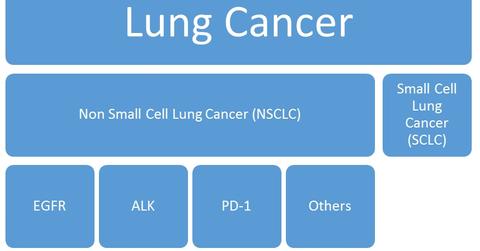Other Drugs for Non-small Cell Lung Cancer
Approximately 85% of all lung cancers in the United States are non-small cell lung cancers, and 10% to 15% of these are EGFR mutation-positive.
Nov. 20 2020, Updated 12:38 p.m. ET

Drugs for NSCLC
As discussed earlier, AstraZeneca’s (AZN) new drug, Tagrisso, was approved for the treatment of non-small cell lung cancer (NSCLC). Approximately 85% of all lung cancers in the United States are NSCLC, and 10% to 15% of these are EGFR mutation-positive. Here, we’ll discuss several drugs used in the treatment of different forms of NSCLC.
Astellas Pharma’s Tarceva
Tarceva is a drug approved for the treatment of patients with advanced NSCLC with common EGFR mutations. Tarceva is a trademark of OSI Pharmaceuticals, an affiliate of Astellas Pharma.
Boehringer Ingelheim’s Gilotrif
Gilotrif is a drug used for the treatment of patients who have advanced NSCLC with common EGFR mutations, and who have not been treated for cancer that has spread to other parts of the body.
Bristol-Myers Squibb’s Opdivo
Bristol-Myers Squibb’s (BMY) latest drug, Opdivo, is approved for the treatment of melanoma, a type of skin cancer, and for the treatment of advanced NSCLC for patients who have progressed after platinum-based chemotherapy. Technically, Opdivo is a human programmed death receptor protein-1 (or PD-1) blocking antibody that reduces tumor growth by blocking the interaction between PD-1 and its ligands. However, as per the company, patients with EGFR mutation or ALK translocation should have disease progression on appropriate targeted therapy prior to receiving Opdivo.
Merck’s Keytruda
Merck’s (MRK) Keytruda is used in the treatment of melanoma. Keytruda also treats non-small cell lung cancer when it has spread. It’s an option if the cancer tests positive for “PD-L1” and chemotherapy containing platinum doesn’t work. It also helps if the tumor has an abnormal “EGFR” or “ALK” gene and EGFR or ALK inhibitors didn’t work.
Other drugs for NSCLC include AstraZeneca’s Iressa, Novartis’s (NVS) Tykerb, Eli Lilly’s (LLY) Erbitux, and Amgen’s (AMGN) Vectibix. Investors can consider ETFs like the VanEck Vectors Pharmaceutical ETF (PPH), holding ~4.5% of its total portfolio in AstraZeneca, or the iShares Global Healthcare ETF (IXJ).
